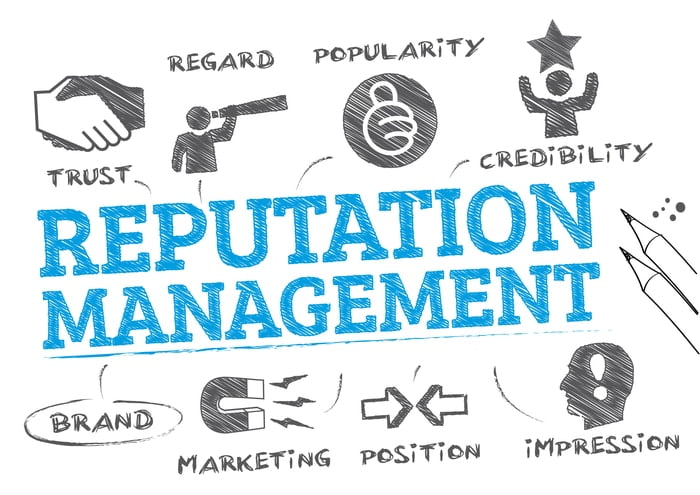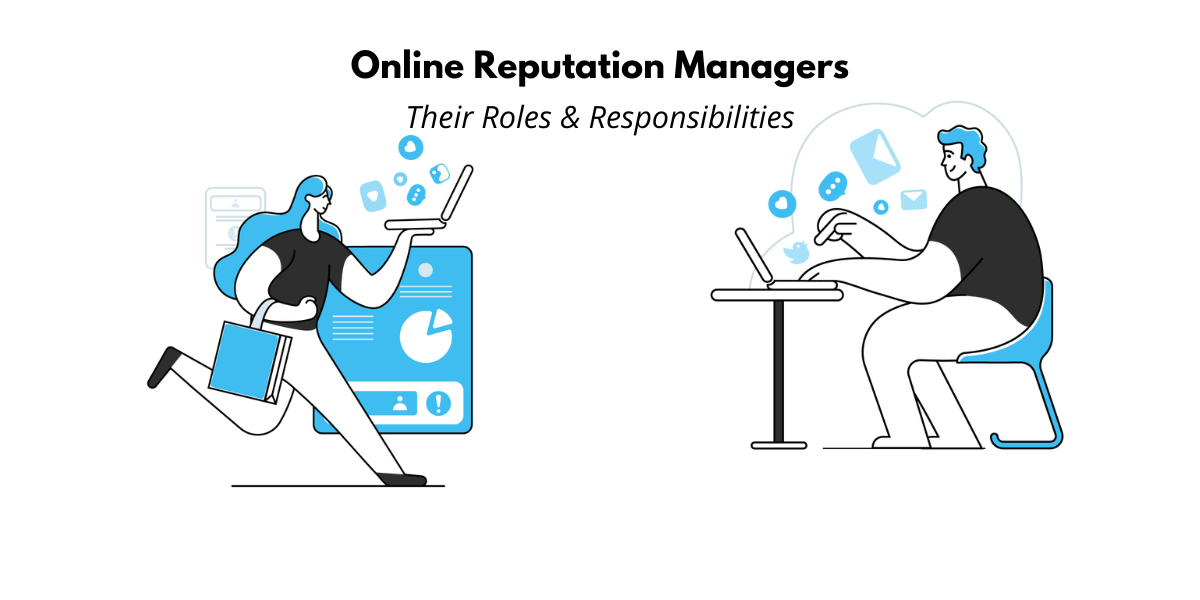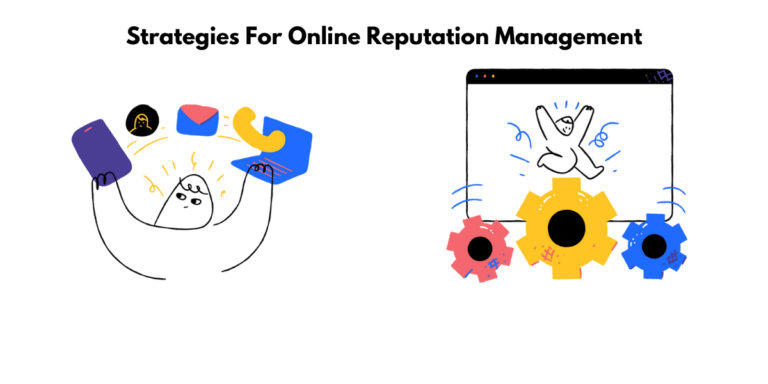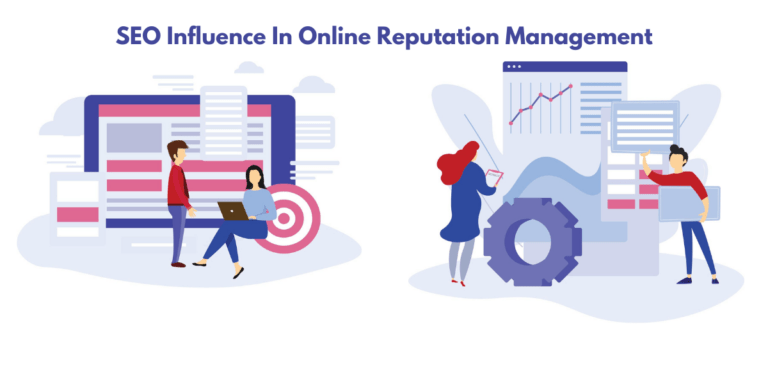How do I manage my reputation online?
Managing online reputations can be a time-consuming and daunting task.
To make it easier, getting an online reputation manager is essential to help you take a proactive approach to fixing and improving your reputation.
Through automation, reputation management software can free up more time for you to focus on running your business.
Once you have the support of reputation management software and services, you can begin to highlight positive items about you online and de-emphasize negative sentiments about you on the internet.
Ultimately, this is crucial to detecting and minimizing any harmful statements about you or your business.
Why is it important to manage your online reputation?
Managing your online reputation is an important component of running a successful business. It is your first impression, and we all know that first impressions are hard to change.
With the power of the internet, more and more consumers are researching businesses before making purchasing decisions, and 79% of people trust online reviews as much as personal recommendations.
This means that managing your online reputation is essential to appear credible and trustworthy in the eyes of potential customers.
A negative online reputation can damage your reputation, reduce sales, and even lead to a crisis of public perception.
It is important to monitor your online presence, proactively manage your brand image, and plan how to respond to negative reviews and comments.
All of this will help to ensure your business remains a trusted source in the eyes of consumers.
Here are some of the benefits of managing your online reputation:
- Improved credibility with customers
- Higher ranking in relevant search results
- Increased sales revenue
- Positive reviews on Google
- More visibility on social media
- Improved customer sentiment online
- Quicker establishment of a stronger brand
- Creating content
- Building social media profiles
- Boosting SEO

Manage Reputation Online: Reputation Managers
Online reputation management strategy (ORM) is the process of monitoring, managing, and influencing a company or individual’s online reputation.
It has become an important part of doing local business in the internet age, as a negative online reputation can significantly impact sales and profits.
ORM is often divided into monitoring, crisis management, and positive reputation recovery. Reputation managers are responsible for overseeing and carrying out these tasks.
1. What is the role of reputation managers?
Brand reputation management is managing a company’s reputation in public relations. It also refers to building and maintaining a company’s overall brand image.
Reputation management is a form of corporate communication that involves monitoring and controlling an organization’s public relations.
It includes:
- crisis management
- media relations
- advertising campaigns
- community involvement
Reputation management for individuals seeks to protect and enhance a company’s reputation by influencing its portrayal in the media, on websites and blogs, and elsewhere.
It is an important part of overall corporate communications and a core social responsibility component.
It has become increasingly important as the internet has given consumers greater access to company information, including news stories and reviews by customers and business partners.
2. What is the difference between a reputation manager and a publicist?
Publicists work externally to strengthen the brand’s image, and reputation management is more reactive.
PR firms typically use advertising and other media promotions. Reputation management firms work to strengthen the company’s online presence, while reputation managers are more concerned with protecting it online.
Reputation management is maintaining or improving your online image and brand reputation.
Reputation management companies help small businesses with this task by using multiple strategies, like content creation, social media management, and monitoring.
Review management is one specific part of reputation management.
Customer reviews play a major role in a brand’s online reputation, so some companies focus on acquiring and managing reviews as their reputation management strategy.
Other companies only use review management as part of their overall reputation management strategy.
3. What does reputation management include?
Online reputation management (ORM) is the practice of monitoring, managing, and influencing online reviews and mentions of a person or business. ORM can include:
- Review management services may include an online reputation management platform like ReviewInc.
- An ORM software platform that connects to a review site and can manage reviews.
- An ORM consultant who will brainstorm and implement the best ways to approach customers for good ratings.
- Digital marketing is just one type of reputation management.
Reputation managers typically create websites, register and fill out social media profiles, and publish content on existing assets to promote their brand and business/individual online.

4. How much does it cost to hire a reputation manager?
Most online reputation management companies offer different packages for different needs.
A free initial analysis is conducted to see which strategies your business can benefit from most. The cost of services varies depending on the type of work needed, with a few hundred dollars typical.
There are many different types of reputation management services. Some only require a contract for three months, six months, or 12 months and can be canceled at any time by the client.
The role of a reputation manager is to help companies build and maintain their online presence. The job can be challenging, but the rewards are worth it for many individuals.
5. What are the responsibilities of a reputation manager?
An online reputation manager is responsible for various tasks to help you maintain a positive image of your brand online.
They will work with you to create a plan and will be your main point of contact for all things related to your online reputation.
Additionally, Google Alert has integrated its reputation management tools into its business listing service, making it easier to keep track of and update your business listings.
Reputation managers should have a strong understanding of SEO
A reputation manager should have a strong understanding of SEO services.
The strategy considers what’s popular and what people search for when trying to find your brand.
The responsibilities of a quality manager include negative search results and brand-focused marketing.
The branded strategy should optimize pages for keyword searches rather than a single website.
Reputation managers should be able to monitor and respond to online reviews
As a reputation manager, it is important to be able to monitor and respond to online reviews. This means being aware of what people say about your brand on the web.
You should choose your target country and keywords, with email reports being sent out daily, weekly, or monthly. This will help you stay up-to-date on any new mentions of your company online.
Creating a dashboard that shows overall metrics for the collected brand mention data is another way to track your company’s online performance.
It’s also important to remember that the online world allows anyone to voice their opinions about your brand on social media sites like Instagram or Twitter.
So you must have a plan in place for how you’ll handle a bad review and positive feedback.
Reputation managers should be able to use online tools and resources effectively
A reputation manager should be able to use online tools and resources effectively.
The most common tool is content management software like WordPress or Drupal, allowing users to edit and manage websites from a central location. This tool is used to generate leads and sales through quality content.
Content marketing is a means of generating leads and sales.
It involves creating and distributing valuable, relevant, and consistent content to attract and retain a clearly-defined audience – and, ultimately, to drive profitable customer action.
Reputations are gained through quality content written in an informative style, with relevant information that provides value for the reader.
A reputation manager must also be familiar with search engine optimization (SEO).
SEO is the practice of improving the ranking of a website on search engines.
There are two types of SEO:
- white-hat SEO
- black-hat SEO.
White-hat SEO practitioners follow Google’s guidelines, while black-hat SEO practitioners do not follow Google’s guidelines resulting in penalization by Google review.
Most SEO tips and techniques about Google search algorithm changes, so reputation managers must stay up-to-date.
Social media platforms are the last aspect of online resources that a reputation manager must be aware of.
Most internet users are on social media, so a reputation manager needs to have a social media strategy in place.

What are some common reputation management strategies?
There are some strategies that reputation managers use to help their clients.
Common strategies include evaluating the client’s online reputation management service, looking for and fixing vulnerabilities, and creating positive content.
These managers are also responsible for maintaining relationships with the media, conducting crisis communication, and more.
You can do a few key things to manage your online reputation.
- First, set up Google Alerts to monitor for any new brand mentions of your name or business online.
- Second, make sure to adjust your social media privacy settings if you’re concerned about what information is publicly available.
- Third, keep your business and professional social media accounts active and engaging; a good reputation combines quality content and people sharing that content.
Claiming and optimizing your business profiles
As a business owner, you want to ensure that your company is well-represented online. This means claiming and optimizing your business profiles on major social media platforms like LinkedIn, Facebook ads, and Twitter.
You’ll also want to make sure that your website is up-to-date and looks professional. You can use free tools like Wix or Squarespace to create a website in minutes.
- Conduct an extensive online reputation audit to determine how your customers view and talk about you online. This will give you an idea of what areas to focus on and what improvements you need to make.
- Open an incognito browser window and Google your brand name. Take note of what sites appear on page one and divide them into ones you can control (like social profiles) and can’t control (like third-party sites).
- Use a tool like Semrush’s Media Monitoring app to learn more about your brand.
- Use WebiMax to find your unclaimed profiles and view a report with all negative content about your business. This will help you identify areas that need to be addressed.
- Work with WebiMax to remove negative results while simultaneously promoting positive ones.
- Receive a custom strategy from WebiMax tailored to your specific needs. This strategy will include dedicated campaign managers and support that can react quickly to negative developments.
- Utilize a tool such as Google My Business to manage your online presence across Maps.
- Monitor your progress using analytics and metrics to track and measure success.
Addressing and resolving negative feedback and reviews
No one is perfect, and every business will receive negative feedback sooner or later. How you address and resolve that feedback can make or break your reputation.
There are plenty of ways to address negative reviews, but the best way is to be proactive and offer solutions.
For example, if a customer complains about a product issue, reach out with a solution rather than waiting for them to come to you.
Responding to reviews will help you build a more authentic connection with a potential customer.
When people see that you take the time to respond to customer feedback – good or bad – they’re more likely to trust your brand name and do business with you.
When a negative review is posted, take accountability and address the issue quickly.
Don’t try to bury it or ignore it – that’ll only make things worse. Address the customer’s concerns head-on, apologize for any inconvenience caused, and offer a solution if possible.
Use customer service as an opportunity to turn a negative review into a positive review by providing a good experience to the customer.
If they had a bad customer experience, make sure they know you’re sorry and work hard to make things right.
Go above and beyond expectations to show them that you value their business.
Creating and distributing positive publicity and press
A company’s reputation is primarily determined by what strangers on the internet think and say about it. This means leaving your reputation up to chance is not a good strategy.
You should take steps to protect and build your online image.
One way to do this is by creating and distributing positive public relations and press.
This involves promoting content where you are favorably mentioned, whether on social media or traditional news outlets.
To ensure you’re reachYou’ll want to use multiple platforms in your campaign to as many people as possible; you’ll want to use with customers directly on shared media or in person.
This lets you get customer feedback and show that you care about your customers’ opinions.
Finally, ensure your website is updated regularly with new, positive information about your company.

How do you choose the best reputation management companies?
Reputation management has become an important part of doing business online.
Protecting your reputation is essential whether you’re a small business just starting or a well-established company. And that’s where reputation management companies come in.
Choosing the best reputation management company can be difficult. Here are some important aspects you should look for in online reputation management agencies:
- A track record of success with enterprise brands similar to yours
- Clear data management, security, and privacy systems
- Sustainable results, not just temporary successes
- Referenceable customers
- Length of time in business
- Understanding of how Google works
- Evaluation of current reputation versus ideal reputation
- Platforms that need help, such as websites, social media, reviews, etc.
- Budget and timeframe of the project
- Level and frequency of customer support
- Strategies that the company employs
- Transparency of services and pricing
- Avoidance of black-hat tactics
- Cost and contract length
- Quality of customer service
- Online reviews and Better Business Bureau complaints
- Services for businesses, individuals, or both.
In conclusion…
In conclusion, online reputation management is essential for any business looking to establish and maintain a positive brand image.
With the rise of social media, the internet, and search engines, it is increasingly important for businesses to monitor and control how their brand is perceived online.
Online reputation management ensures that accurate information about a brand is disseminated and helps build customer trust and credibility.
Online reputation managers provide an invaluable service to businesses by monitoring, collecting, managing, and marketing positive customer reviews and mentions to ensure that a business’s online reputation is managed effectively.







